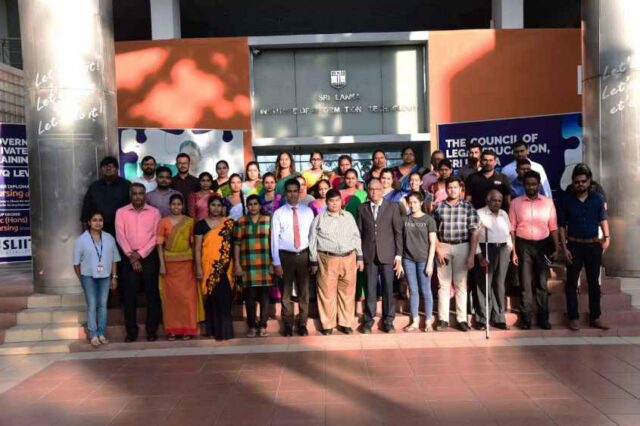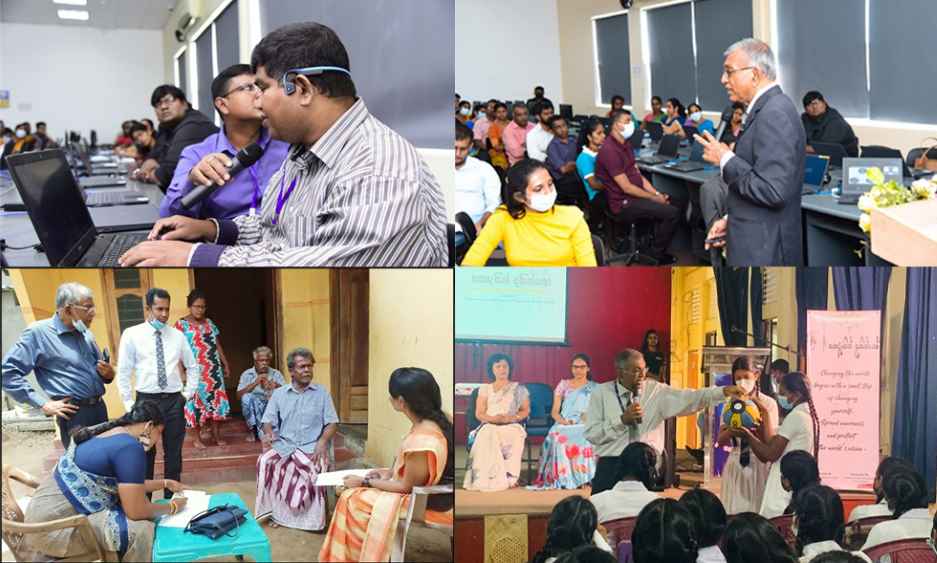Reiterating its strong culture of research, SLIIT has pioneered the first-ever comprehensive research project to empower persons with visual impairment and blindness in Sri Lanka, showcasing the need to improve their quality of life and highlighting their employability potential.
The research, undertaken by the SLIIT School of Business, was funded by the World Bank– AHEAD Research Project titled ‘Socio-economic Status and Employment Potential of Visually Impaired and Blind Persons in Sri Lanka’. The research, which comprised both qualitative and quantitative work, was carried out over a period of three and a half years, resulting in over 45 different outputs including local and international journal publications, conference presentations, and a number of dissertations including MPhil, Masters and final year undergraduate research projects.
By undertaking this research project, SLIIT’s primary objective was to address the social, economic, and overall well-being of persons with visual impairment and blindness. By understanding their needs and challenges, the project was able to develop strategies and models that could enhance their quality of life.
The study also focused on gathering data regarding the different types of visual impairments and their prevalence and distribution across the identified population. This information will assist in targeting specific areas for intervention and resource allocation. SLIIT’s research also sought to identify the skills, training, and support required for these individuals to promote their employability in the job market – thereby understanding the existing job market opportunities and potential barriers and proposing recommendations for creating inclusive employment opportunities.

Professor Theekshana Suraweera, the Research Team Leader of the project, the founder and Dean, School of Business, stated, “A research project of this magnitude, exploring the socio-economic issues of people with visual impairment and blindness, has not been conducted in Sri Lanka before and that marks a distinct milestone in recent history. The passionate support, commitment and dedication of the two research team members, Professor Samantha Thelijjagoda, Pro Vice-Chancellor (Research & International) and Professor Ruwan Jayathilaka, and Professor Suren Peter, Dean, School of Business, the research manager and other research assistants are worth special mentioning. Furthermore, several other academics and scholars who themselves are visually impaired and blind made this a unique study. We believe that this research would make a significant impact on the lives of those living with visual impairments and blindness in Sri Lanka. It also highlights SLIIT’s commitment to inclusivity, accessibility, and the promotion of equal opportunities for all.”
Overall, the SLIIT research project on visual impairment and blindness has not only contributed to the academic and research landscape but has also had a positive impact on students, faculty, and external stakeholders.
The project has significantly enhanced the overall research culture within SLIIT. Through the project, approximately six faculty members, 40 undergraduate students of SLIIT Business School and a couple of external collaborators passionate about this research discipline have participated in conducting this research study. A significant achievement in this respect is that the project supported a graduate teacher who is from a blind community, to complete his Master of Education (M.Ed.) degree. Furthermore, one faculty member in the business school also successfully completed a Master of Philosophy (MPhil) degree under the project. Another noteworthy outcome, which was brought about by the project, though not one of its core obligations, was the formation of the research working paper series at SLIIT Business School. This forum, which is open for local researchers, encourages participants to share their research findings, obtain feedback, generate new ideas, and create new connections with scholars within and outside the SLIIT community All in all, these hands-on and field-level research experiences have provided valuable learning opportunities for students, allowing them to contribute to the field and benefit from practical research experience.
The project has in many ways, helped to disseminate knowledge and create awareness among the community to the unique challenges faced by individuals with visual impairment. This exposure has raised awareness and understanding even within SLIIT, regarding the needs and perspectives of people with different impairments.
As an extra initiative, SLIIT also successfully organized a training program in collaboration with the National Apprentice and Industrial Training Authority (NAITA), which involved training of fifty three ICT trainers from all regions of the country. The workshop focused on equipping these trainers with the necessary skills and knowledge to work with individuals who are blind or visually impaired. It is interesting to note that the principal resource persons of this training of trainers were experts in ICT, who were also visually impaired and blind.
In addition to research and academic work in this discipline, the SLIIT community has also recognised the importance of working with people with visual disabilities. As a result, the SLIIT Business Scholl undergraduate students recently organised a musical event centred around social inclusion. The event brought together sighted undergraduates from SLIIT and those who are blind and visually impaired from the University of Colombo and the University of Kelaniya, not only to showcase their musical talents but to demonstrate that such diverse groups can work in harmony to achieve a noble goal. The event promoted inclusivity, empowering individuals with visual impairments, and fostering a sense of unity and collaboration among students from diverse backgrounds.
Additionally, the research project has facilitated communication and collaboration with various organizations and individuals working with the visually impaired community. Importantly, the project has strengthened SLIIT’s commitment to addressing societal challenges and promoting inclusivity in education and research.
This research project in the long run would facilitate realising the UN Sustainable Development Goals related to reducing “inequality within and among countries by empowering and promoting the social, economic and political inclusion of all, including persons with disabilities”. SLIIT Business School will continue to spearhead such pioneering initiatives, in the future as well




